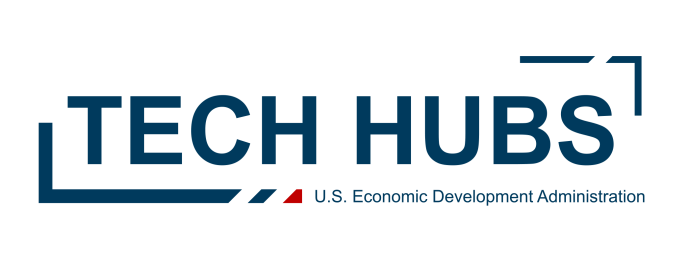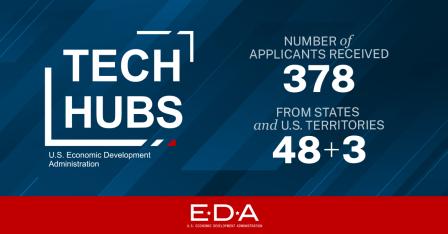Biden-Harris Administration’s Tech Hubs Competition Applications Show Nationwide Excitement for Investing in America’s Technological Future

WASHINGTON, DC — The U.S. Department of Commerce’s Economic Development Administration (EDA), announced the receipt of hundreds of applications for Phase 1 of the Regional Technology and Innovation Hubs (Tech Hubs) competition, a key piece of President Biden’s Investing in America agenda. In total, 48 states and 3 territories submitted Tech Hubs Phase 1 applications.

Phase 1 of this competition will designate Tech Hubs in regions across the country that bring together industry, higher education institutions, state and local governments, economic development organizations, and labor and workforce partners to supercharge ecosystems of innovation for technologies that are essential to our economic and national security. Phase 1 will separately award approximately $15 million in strategy development grants to accelerate the development of future Tech Hubs. Later this year, the Department of Commerce will launch phase 2 of the competition, for applicants designated as a Tech Hub to apply for implementation funding.
From the program’s launch on May 12, 2023, until the application window closed on August 15, 2023, 378 applications were received from 247 unique lead consortia members:
- 68 (28%) submitted only applications for a Tech Hubs Designation;
- 124 (50%) submitted applications for both Designation and Strategy Development Grants; and
- 55 (22%) submitted only applications for Strategy Development Grants.
The Tech Hubs designation will be a widely recognized indicator of a region’s potential for rapid economic growth, making it attractive to additional private investment and job creation. Strategy Development Grants aim to enable consortia to significantly increase local coordination and planning activities to be more competitive for this and any future iterations of the Tech Hubs program.
Applicants requested more than $75 million in Federal funding for strategy development grants across the 181 Strategy Development Grant applications. EDA is currently reviewing all 378 applications and will announce which applicants will receive Tech Hub designations in Fall 2023. The designated Tech Hubs will be invited to apply for Phase 2 funding after they are announced in the Fall.
“The Biden-Harris Administration’s Tech Hubs competition has revved-up America’s innovation engine, inspiring regions to come together and dream big for their future. We see a rich diversity of technologies, geographies, and communities represented in these applications, helping ensure we invest equitably in America’s technological and national security future,” said Assistant Secretary of Commerce for Economic Development Alejandra Y. Castillo. “We look forward to announcing the designated Tech Hubs this fall, and beginning the important work of ensuring critical innovation ecosystems and jobs start, grow, and remain in America.”
EDA expects to designate at least 20 Tech Hubs across the country and make approximately 30 strategy development awards utilizing approximately $15 million of the $500 million available.
Authorized by the CHIPS and Science Act, the Tech Hubs competition is a key part of President Joe Biden’s Investing in America agenda of stimulating private sector investment, creating good-paying jobs, revitalizing American manufacturing, and ensuring no community is left behind by America’s economic progress.
Additional information on the Tech Hubs program can be found at TechHubs.gov
About the U.S. Economic Development Administration (www.eda.gov)
The mission of the U.S. Economic Development Administration (EDA) is to lead the federal economic development agenda by promoting competitiveness and preparing the nation’s regions for growth and success in the worldwide economy. An agency within the U.S. Department of Commerce, EDA invests in communities and supports regional collaboration in order to create jobs for U.S. workers, promote American innovation, and accelerate long-term sustainable economic growth.
